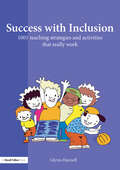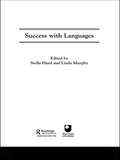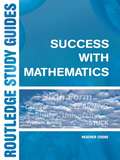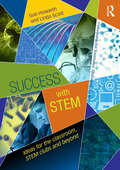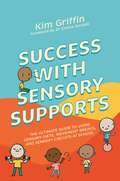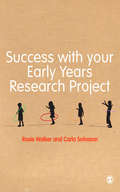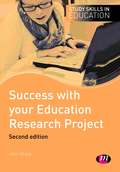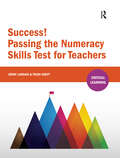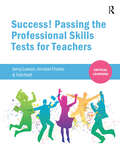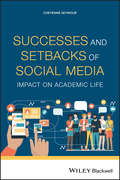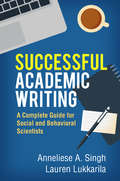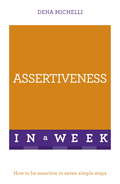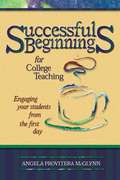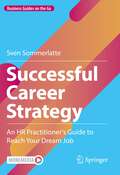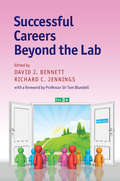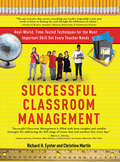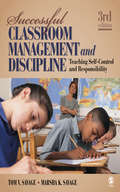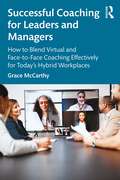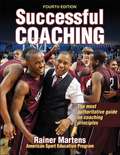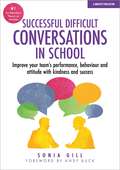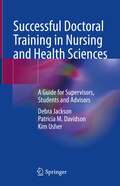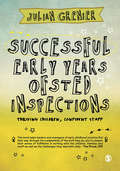- Table View
- List View
Success with Inclusion: 1001 Teaching Strategies and Activities that Really Work
by Glynis HannellToday's classroom welcomes diversity, where many levels, speeds and styles of learning coexist. Success with Inclusion provides over 1000 specific strategies to help identified areas of difficulty or advanced development. Using this book, teachers will be able to: quickly and easily identify and record their pupils’ individual learning patterns using the observation charts provided structure a well planned inclusive environment implement creative and thoughtful learning interventions. create an atmosphere of flexibility and compassion. Author and experienced teacher Glynis Hannell gets down to the nitty gritty with chapters full of practical and creative ideas that will help accommodate not only pupils with difficulties but also those who are advanced. Learning strategies here will help you to: be an effective inclusive teacher address a variety of reading difficulties support pupils' writing skills make maths comprehensible, fun and relevant enhance pupils' concentration encourage habits of organisation foster teamwork between yourself, colleagues, parents and pupils. The 42 photocopiable worksheets, checklists, charts, games and planners are provided in the appendix to give teachers a headstart. Also here are observation charts, literacy and maths resources, as well as support materials for teachers, pupils and parents.
Success with Languages
by Linda Murphy Stella HurdSuccess with Languages is designed to help all students develop the skills they need to become an effective language learner and to make the most of language study. Written by experienced language teachers at the Open University, this book offers undergraduates and postgraduates crucial and practical advice on important areas such as: choosing a language and study programme setting personal goals for language learning and monitoring progress using ICT to support language learning. Each of the ten chapters features a number of exercises in order to help students assess the ways they learn and consider where improvements can be made, making the most of the media available and how to use resources effectively.
Success with Mathematics
by Heather CookeMany students find the leap between school and university level mathematics to be significantly greater than they expected. Success with Mathematics has been devised and written especially in order to help students bridge that gap. It offers clear, practical guidance from experienced teachers of mathematics in higher education on such key issues as: * getting started* ways of studying* assessment* mathematical communication* learning by doing* using ICT* using calculators* what next.After reading this book, students will find themselves better prepared for the change in pace, rigour and abstraction they encounter in degree level mathematics. They will also find themselves able to broaden their learning strategies and improve their self-directed study skills. This book is essential reading for anyone following, or about to undertake, a degree in mathematics, or other degree courses with mathematical content.
Success with STEM: Ideas for the classroom, STEM clubs and beyond
by Linda Scott Sue HowarthSuccess with STEM is an essential resource, packed with advice and ideas to support and enthuse all those involved in the planning and delivery of STEM in the secondary school. It offers guidance on current issues and priority areas to help you make informed judgements about your own practice and argue for further support for your subject in school. It explains current initiatives to enhance STEM teaching and offers a wide range of practical activities to support exciting teaching and learning in and beyond the classroom. Illustrated with examples of successful projects in real schools, this friendly, inspiring book explores: Innovative teaching ideas to make lessons buzz Activities for successful practical work Sourcing additional funding Finding and making the most of the best resources STEM outside the classroom Setting-up and enhancing your own STEM club Getting involved in STEM competitions, fairs and festivals Promoting STEM careers and tackling stereotypes Health, safety and legal issues Examples of international projects An wide-ranging list of project and activity titles Enriched by the authors’ extensive experience and work with schools, Success with STEM is a rich compendium for all those who want to develop outstanding lessons and infuse a life-long interest in STEM learning in their students. The advice and guidance will be invaluable for all teachers, subject leaders, trainee teachers and NQTs.
Success with Sensory Supports: The ultimate guide to using sensory diets, movement breaks, and sensory circuits at school
by Kim GriffinSensory needs are being recognised as a vital part of learning, development and engagement within the classroom and are being used more often to make education both accessible and fun. To harness the full potential of sensory supports, using these strategies correctly is key!This is the essential guide to using sensory strategies successfully with school children, from occupational therapist, Kim Griffin, who has 20 years of experience supporting sensory needs.As you make your way through the book, you will be joined by Isla and Noah, two children whose stories will help illustrate how information in the book can be used practically. In addition, the book includes personal anecdotes from Kim, links to further reading, reflective questions and teacher perspectives to show how a teacher might use the information in the classroom. These features will help you easily identify sensory needs and use sensory tools effectively.
Success with your Early Years Research Project
by Rosie Walker Carla Solvason'Action research and Early Years practices go together, as naturally as the new day rising. This book is a celebration of new days. Early Years research is a practice for creative thinking for new tomorrows; the book shows us how to do this, and is to be commended for anyone who wishes to find innovative ways to think and act for all new beginnings.' -Jean McNiff, Professor of Educational Research, York St John University Where do you start with a research project? How do you choose a good question? What are tutors looking for in an outstanding project? This book will help you answer all of the above and that is just the beginning. With examples of real research projects from students just like you, it takes you through each step of the process including: Choosing your question and approach Making sure your research is ethical Gathering and analysing data Reaching conclusions Putting your findings into practice. After each example the authors provide commentary on what made each project so good, or what needed more work, helping you see what a good project really looks like. Suitable for anyone tackling a research project as part of the Early Years course, at foundation or degree level, this book will help you make sure your project is interesting, relevant and impacts on your practice.
Success with your Education Research Project
by John SharpSuccess with your Education Research Project is a practical, user-friendly text on research methods aimed specifically at undergraduate students on education courses. Research projects are carried out in schools and non-school settings by nearly all undergraduates in teacher training, Education Studies and other educational disciplines, and this book makes clear references to these courses and contexts throughout. All chapters include learning outcomes, worked examples, practical and reflective tasks and summaries of key points. Topics such as using the net and plagiarism are covered with up to date information, while key content on literature searches, crtical thinking and the development of argument provides clear guidance and ensures deeper understanding. This new edition has been updated throughout to provide greater depth on many topics. Study Skills in Education This series addresses key study skills in the context of education courses, helping students indentify their strenghts and weaknesses, increase their confidence and realise their academic potential. The books are suitable for students on: - any course of Initial Teacher Training leading to the award of QTS (primary or secondary) - degree course in Education or Education Studies with or without QTS - degree courses in Early Years or Early Childhood Studies; - foundation degrees in Education or any education-related subject discipline
Success with your Education Research Project (Study Skills in Education Series)
by John SharpSuccess with Your Education Research Project is a practical, user-friendly text on research methods aimed specifically at undergraduate students on education courses. Research projects are carried out in schools and non-school settings by nearly all undergraduates in teacher training, Education Studies and other educational disciplines, and this book makes clear references to these courses and contexts throughout. All chapters include learning outcomes, worked examples, practical and reflective tasks and summaries of key points. Topics such as using the Net and plagiarism are covered with up to date information, while key content on literature searches, critical thinking and the development of argument provides clear guidance and ensures deeper understanding. This new edition has been updated throughout to provide greater depth on many topics. Study Skills in Education This series addresses key study skills in the context of education courses, helping students indentify their strenghts and weaknesses, increase their confidence and realise their academic potential. The books are suitable for students on: - any course of Initial Teacher Training leading to the award of QTS (primary or secondary) - degree course in Education or Education Studies with or without QTS - degree courses in Early Years or Early Childhood Studies; - foundation degrees in Education or any education-related subject discipline
Success! Passing the Numeracy Skills Test for Teachers (Critical Learning)
by Trish KreftAn ESSENTIAL book for anyone who wants to pass the Numeracy Skills Test for Teachers. You must pass this test before starting your course, and this up to date text tells you exactly what to expect and how to prepare for the latest version of the test. There is an emphasis on support and clear guidance throughout, along with plenty of practice material, so you can face the test with confidence and succeed in your application. It provides: a guide to the variety of Initial Teacher Training (ITT) provision and routes into teaching a preparation timeline comprehensive coverage of the numeracy test an audit of your strengths and areas for improvement in numeracy example questions and answers, highlighting common errors, providing top tips for success, with theories and methods fully explained full practice papers plus test-taking and revision strategies discrete topics enable focused learning, with explanations and hundreds of examples larger format pages for ease of use and more memorable learning.
Success! Passing the Professional Skills Tests for Teachers (Critical Learning)
by Jenny Lawson Annabel Charles Trish KreftAn essential book for anyone thinking of taking, or about to take, the Professional Skills Tests for Teachers. You must pass these tests before starting your course, and this up to date text tells you exactly what to expect and how to prepare for the latest versions of the tests. There is an emphasis on support and clear guidance throughout, along with plenty of practice material, so you can face the tests with confidence and succeed in your application. It provides: a guide to the variety of Initial Teacher Training (ITT) provision and routes into teaching a preparation timeline comprehensive coverage of both the numeracy and literacy tests an audit of your strengths and areas for improvement in literacy and numeracy example questions and answers, highlighting common errors, providing top tips for success, with theories and methods fully explained full practice papers plus test-taking and revision strategies discrete topics within the numeracy and literacy sections enabling focused learning, with explanations and hundreds of examples larger format pages, with topics covered across double page spreads for ease of use and more memorable learning.
Successes and Setbacks of Social Media: Impact on Academic Life
by Cheyenne SeymourDiscover the real-life impacts of social media use through a collection of fascinating academic perspectives Successes and Setbacks of Social Media: Impact on Academic Life rigorously explores the positive and negative impacts of social media as a communication tool. The book incorporates a diverse group of opinions and perspectives, all of which reflect on how social media might influence academic success, relationships, self-worth, and engagement with virtual networks. Accomplished academic and editor Dr. Cheyenne Seymour delivers an insightful examination of the different ways that social media can catapult people into success or failure. Four key areas are explored: academics, authenticity, relationships, and self-worth. Each area contains a synthesis of the latest research, supplemented with contributions that explore the negative and positive aspects of each area. The editor also includes perspectives that discuss emerging technologies, the impact they have on social media, and the impacts they might have in the future. The book offers readers a wide variety of benefits, including: An informative synthesis of peer-reviewed research about the impact of social media on individuals today Chapters that investigate both positive and negative aspects of social media across multiple demographics and usage scenarios Illuminating reports on experiences with several social media platforms, including Facebook, Instagram, and Snapchat An analysis of potential future developments and emerging technologies in social media and the coming social and ethical concerns that might arise Perfect for advanced undergraduate and graduate level students across a variety of disciplines, but particularly in courses on social media, mass communication, relational communication, and strategic communication, Successes and Setbacks of Social Media also belongs on the bookshelves of anyone with even a passing interest in the real-world impacts of social media usage.
Successful Academic Writing: A Complete Guide for Social and Behavioral Scientists
by Anneliese A. Singh Lauren LukkarilaUsing rich examples and engaging pedagogical tools, this book equips students to master the challenges of academic writing in graduate school and beyond. The authors delve into nitty-gritty aspects of structure, style, and language, and offer a window onto the thought processes and strategies that strong writers rely on. Essential topics include how to: identify the audience for a particular piece of writing; craft a voice appropriate for a discipline-specific community of practice; compose the sections of a qualitative, quantitative, or mixed-methods research article; select the right peer-reviewed journal for submitting an article; and navigate the publication process. Readers are also guided to build vital self-coaching skills in order to stay motivated and complete projects successfully. User-Friendly Features *Exercises (with answers) analyzing a variety of texts. *Annotated excerpts from peer-reviewed journal articles. *Practice opportunities that help readers apply the ideas to their own writing projects. *Personal reflections and advice on common writing hurdles. *End-of-chapter Awareness and Action Reminders with clear steps to take.
Successful Assertiveness in a Week: Teach Yourself
by Dena MichelliThe ability to assert yourself - to stand up for yourself while ensuring a win-win outcome - is crucial to anyone who wants to advance their career.Written by Dena Michelli, a leading expert on appraisals as both a coach and a practitioner, this book quickly teaches you the insider secrets you need to know to in order to be assertive.The highly motivational 'in a week' structure of the book provides seven straightforward chapters explaining the key points, and at the end there are optional questions to ensure you have taken it all in. There are also cartoons and diagrams throughout, to help make this book a more enjoyable and effective learning experience.So what are you waiting for? Let this book put you on the fast track to success!
Successful Beginnings for College Teaching: Engaging Your Students from the First Day
by Angela Provitera-McglynnLaying the groundwork for a successful semester starts with the first day of class. Author Angela Provitera McGlynn tells that the first day is not the day to pass out a syllabus and let everyone go. Rather, it's the day to set the context for the rest of the semester. The author stresses the need for developing an atmosphere of respect for diversity while simultaneously providing a safe and exciting place to explore differences. Included are a whole variety of ice breakers and other exercises to keep students engaged and interacting. In addition, such vital issues as environment, motivation, and civility are addressed with suggestions for promoting positive interactions.
Successful Career Strategy: An HR Practitioner's Guide to Reach Your Dream Job (Business Guides on the Go)
by Sven SommerlatteAdvancing your career in the best possible way requires a well-structured and targeted approach. This book offers a basic methodology as well as practical tools and a variety of case studies that are helpful for the development and implementation of a career strategy. It helps to match talents with aspirations in order to encourage candidates to make courageous career decisions and offers guidance on how to choose the professional environment that best fits personal preferences. Thus, it can be a guide to considering your career as a lifelong learning journey that can help you grow as a leader and as an individual.The book is primarily aimed at young professionals who want to develop their career in the most effective way. It is also useful for managers to be able to advise and support the professional development of their team members. Videos via app: download the SN More Media app for free, scan a link with play button and access videos directly on your smartphone or tablet.
Successful Careers beyond the Lab
by Richard C. David J. Bennett JenningsThere is a major demand for people with scientific training in a wide range of professions based on and maintaining relations with science. However, there is a lack of good first-hand information about alternative career paths to research. From entrepreneurship, industry and the media to government, public relations, activism and teaching, this is a readable guide to science based skills, lifestyles and career paths. The ever-narrowing pyramid of opportunities within an academic career structure, or the prospect of a life in the laboratory losing its attraction, mean that many who trained in science and engineering now look for alternative careers. Thirty role models who began by studying many different disciplines give personal guidance for graduates, postgraduates and early-career scientists in the life sciences, physical sciences and engineering. This book is an entertaining resource for ideas about, and directions into, the many fields which they may not be aware of or may not have considered.
Successful Classroom Management
by Richard H. Eyster Christine MartinEach year, tens of thousands of new teachers head out for their first teaching job, ready to fulfill a lifetime dream. However, most teachers have nothing to prepare them for or support them on one of the most important parts of their job: how to effectively run a classroom and handle the students. Successful Classroom Management is the first book to give you the skills you need to manage a classroom effectively. Richard H. Eyster and Christine Martin present the lessons that have made them the most sought-after seminar trainers on the topic, addressing: Handling Classroom Problems Troubleshooting Issues Enforcing Discipline Inspiring Students Creating an Engaging Classroom Atmosphere Filled with expert advice, stories and tips from teachers, and spot-on techniques, this is your new essential handbook that will help you not only survive in the classroom, but also live your dream and give your students the full gifts that come from a great education.
Successful Classroom Management and Discipline: Teaching Self-Control and Responsibility
by Tom V. Savage Dr Marsha K. SavageFocusing on how educators can facilitate the development of self-control and responsibility in students, Successful Classroom Management and Discipline offers comprehensive yet concise coverage of the preventative aspects of classroom management, as well as a wide range of effective intervention strategies. In this Third Edition, authors Tom Savage and Martha K. Savage offer new and updated coverage of teacher stress, legal dimensions of management and discipline, teacher/family collaboration, and bullying. Key FeaturesFeatures a two-part structure to pinpoint the key dimensions of classroom management: how to prevent classroom issues and how to respond to problems that arise Identifies a measurable goal for K–12 teachers: helping students to develop self-control and responsibility Addresses "teacher burnout" through practical application of stress management Describes bullying behaviors and teacher response, including a section on working with parents, a vital skill for avoiding and resolving serious problems Presents realistic case studies and "What Would You Do?" scenarios to demonstrate chapter concepts
Successful Coaching for Leaders and Managers: How to Blend Virtual and Face-to-Face Coaching Effectively for Today's Hybrid Workplaces
by Grace McCarthyThe rapid pace of change in the post-COVID world has made it more important than ever for managers to coach individual employees and teams effectively both online and face to face. This book draws on research from around the world and shares good practices to help managers become effective leaders in face-to-face, virtual, and hybrid workplaces.The book examines how the coaching skills of observation, listening, questioning, goal-setting, feedback, and reflection can be used effectively with individuals and teams. Boxes offering scenarios and practical activities help the reader understand how to apply these skills in real life. The book goes on to explore coaching at the organisational level, bringing in systems thinking, coaching culture, cross-cultural coaching, and coaching in multi-national organisations. Finally, the book considers ways for managers to evaluate and improve their coaching, including how to use technology and GenAI to support coaching.This book synthesises different strands of research to help managers develop their coaching skills both face to face and online. HR managers will find ideas for how best to support managers in developing their skills. Researchers and educators interested in managerial coaching and successful leadership in the post-COVID hybrid workplace will also find food for thought.
Successful Coaching, Fourth Edition
by Rainer MartensThis comprehensive text includes content on how to communicate and motivate players, as well as manage problem behaviours among athletes with a positive approach. It provides a full introduction to the games approach to coaching and strategic advice on how to incorporate this into a successful programme. Successful Coaching is the text for the American Sport Education Program's (ASEP) Coaching Principles course and is widely used as a text in college introductory coaching courses.
Successful Difficult Conversations: Improve your team's performance, behaviour and attitude with kindness and success
by Sonia GillWhether you are a Head or Deputy Head, a Head of Department or Year 3 Teacher, this book is an invaluable read. It is full of practical ways to help you, when facing one of `those' conversations with a colleague or parent, you know in your heart you need to have, but would rather avoid having, because you don't really know what to say or how to say it.
Successful Difficult Conversations: Improve your team's performance, behaviour and attitude with kindness and success
by Sonia GillWhether you are a Head or Deputy Head, a Head of Department or Year 3 Teacher, this book is an invaluable read. It is full of practical ways to help you, when facing one of `those' conversations with a colleague or parent, you know in your heart you need to have, but would rather avoid having, because you don't really know what to say or how to say it.
Successful Doctoral Training in Nursing and Health Sciences: A Guide for Supervisors, Students and Advisors
by Debra Jackson Kim Usher Patricia M. DavidsonThis textbook is a practical, user-friendly and essential guide for doctoral students, their supervisors and advisors and administrators of doctoral programs in nursing and health sciences. Nurses and health scientists have a relatively young tradition of doctoral training, and this means students often come to doctoral studies without a clear understanding of what is required to be successful at this level of education. Supporting students to successful completion of doctoral studies involves a complex fusion of skills, and yet researchers and academics receive little specialist training in this crucial area of teaching and learning. Strong pedagogies around doctoral supervision and writing are essential because in addition to the scientific, research and educative skills required, it is important to be able to establish and maintain enabling professional relationships within which both parties can thrive, and that can withstand the years of critique needed for doctoral work. The authors offer supervisors, advisors, students and administrators practical advice on helping students thrive, and steering them through various challenges that can arise during doctoral candidature. With a focus on nursing and health sciences, the authors take a global approach, recognising the international focus of doctoral training in nursing and health sciences. The authors of this book are experienced supervisors and advisors to doctoral students and together, have well over 100 successful doctoral completions and more than 1000 publications. They draw on a series of interviews and case studies to share their knowledge and experience and provide insights and guidance to inspire and support student progression and ensure students get the most out of their doctoral studies.
Successful Early Years Ofsted Inspections: Thriving Children, Confident Staff
by Mr Julian GrenierThe stakes have never been higher: Ofsted have a new, tougher inspection framework for the early years. If you are judged to be less than good, you risk losing funding for places. A reputation that took years to build can vanish overnight. But instead of hiding behind the "Ofsted monster" to get things done, Early Years expert Julian Grenier argues that it's time to do what's right for children and families, and build long-lasting and effective provision. Completely up to date with Ofsted's new Common Inspection Framework and avoiding a 'tick-box' approach to preparation, Julian focuses on the importance of developing your provision and your team up to and beyond inspection day. It is accompanied by easy-to-use time-saving pro formas and self-reflective documents that can be downloaded online for free. This book is ideal for head teachers, senior leaders, EYFS co-ordinators, nursery managers and Early Years practitioners.
Successful Early Years Ofsted Inspections: Thriving Children, Confident Staff
by Mr Julian GrenierShortlisted for Best Professional Book by Nursery World Awards 2017! The stakes have never been higher: Ofsted have a new, tougher inspection framework for the early years. If you are judged to be less than good, you risk losing funding for places. A reputation that took years to build can vanish overnight. But instead of hiding behind the “Ofsted monster” to get things done, Early Years expert Julian Grenier argues that it’s time to do what’s right for children and families, and build long-lasting and effective provision. Completely up to date with Ofsted’s new Common Inspection Framework and avoiding a ‘tick-box’ approach to preparation, Julian focuses on the importance of developing your provision and your team up to and beyond inspection day. It is accompanied by easy-to-use time-saving pro formas and self-reflective documents that can be downloaded online for free. This book is ideal for head teachers, senior leaders, EYFS co-ordinators, nursery managers and Early Years practitioners. “We had our Ofsted Inspection on May 31st and achieved an Outstanding grade which we are very proud of, as you might imagine! I used Successful Early Years Ofsted Inspections to focus my thoughts when preparing for the inspection and I am sure it was a contributory factor in our grade.” -Wendy Taylor, Nursery Manager, Acorns Nursery Julian Grenier will be discussing ideas from Successful Early Years Oftsed Inspections in the SAGE Early Years Masterclass, a free professional development experience hosted by Kathy Brodie. To sign up, or for more information, click here.
